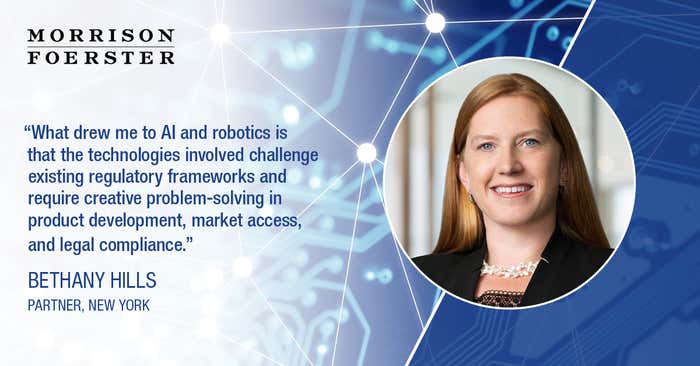
Bethany Hills is a litigation partner in MoFo’s New York office. Her practice focuses on advising her life sciences clients on both pre- and post-market issues, from FDA submissions and communications strategies to post-approval compliance and reimbursement issues. As part of the Diverse in Practice series, we asked Bethany about working cross-functionally with the Artificial Intelligence + Robotics Group, and how the team’s unique voices and perspectives are driving outstanding client outcomes.
What was it that initially drew you to AI and robotics law?
The laws that impact AI and robotics in the healthcare industry are the full range of laws that I focus on in my practice – the laws that govern the practice of medicine, protections of patients, and the development and approval of medical devices. Surgical robots have been in use since the 1980s, but the real game changer is the addition of machine learning technology that enables decision support, user fatigue alerting, and self-correcting parameters. What drew me to AI and robotics is that the technologies involved challenge existing regulatory frameworks and require creative problem-solving in product development, market access, and legal compliance.
Do you have any examples of interesting work you’ve performed in the AI and robotics space?
Nearly two-thirds of the work that I do on the pre-market product development side of my practice involves artificial intelligence. A good deal of these products are software-only devices – lung nodule analysis, pathology image analysis, measurement and tracking algorithms, and other products offering the combination of an AI technology, like machine learning, in conjunction with clinical decision support modules aimed at clinicians. I’ve evaluated the FDA regulatory requirements for surgical robotics and also for other therapeutic devices that are interventional or therapeutic that combine AI and robotic functionality.
Do you have any examples of how AI and robotics are being used to promote diversity and inclusion, or suggestions on how this can be done in the future?
There is much discussion right now about the biases that can be found in AI technologies. These are fascinating policy and cultural discussions, but at their core I truly think AI and robotics can level the playing field in healthcare. AI and robotics can improve consistency and accuracy and supplement human skill sets in a way that eliminates human variability. AI tools allow for healthcare providers to have a deeper understanding of the data available to them and, again, can eliminate disparities in the analysis and processing of data.
And while there are still few examples of robotic applications that are consumer-facing, there is promise for robotic devices that can assist in home care and end of life care that could fundamentally change the dynamics of geriatric and chronic care. So, yes, definitely there is a promise for impacting diversity and inclusion in healthcare, particularly in the area of patient access and experience.
Learn more about MoFo’s commitment to the recruitment, retention, and advancement of diverse attorneys here.